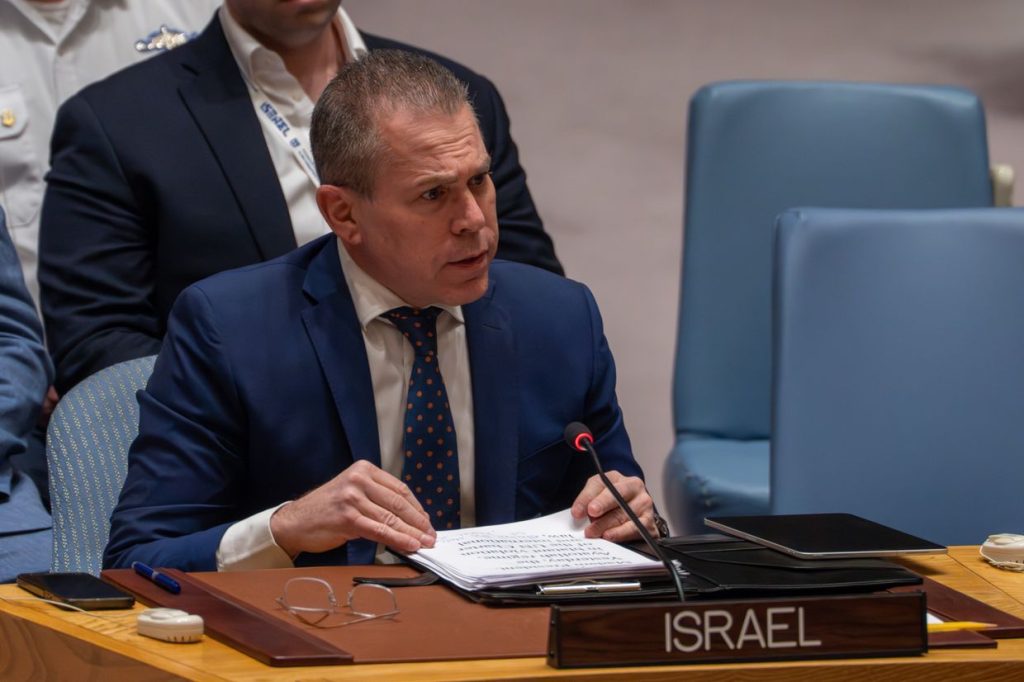The Permanent Representative of Israel to the United Nations, Gilad Erdan, urged the international community to condemn Iran for launching an attack on Israel. The attack, which occurred on April 14, saw Iran launching 170 drones, 30 cruise missiles, and 120 ballistic missiles at Israel. While the majority of these were intercepted outside Israel, a few ballistic missiles caused minor damage to the Nevatim Air Force Base. President Volodymyr Zelensky of Ukraine also condemned the attack, drawing parallels between the use of Iranian drones in the Middle East and Europe. This incident has raised concerns about escalating tensions in the region, prompting an emergency meeting of the U.N. Security Council in New York City.
The attack by Iran on Israel was seen as a response to Israel’s strike on an Iranian consulate in Syria on April 1, which was part of the broader conflict between Israel and Hamas. In retaliation, Israel targeted the Iranian consulate, citing attacks by Iran’s proxies Hamas and Hezbollah on its territory. President Zelensky of Ukraine, who has firsthand experience of similar attacks in his country, called on allies to prevent further escalation in the Middle East. It was revealed that Iran has provided Russia with Shahed drones, which Moscow has used to attack Ukrainian cities and infrastructure, resulting in civilian casualties. The Ukraine military intelligence agency indicated that Iran and Hezbollah train Russian drone operators in Syria for deployment in Ukraine.
Israel has maintained neutrality in Russia’s war against Ukraine and has not provided significant military aid to Ukraine. Despite facing similar challenges from Iranian weaponry, Israel has refrained from taking sides in the conflict between Russia and Ukraine. The latest developments in the Ukraine war include Russia setting a goal to capture Chasiv Yar by ‘Victory Day’ on May 9. The situation on the eastern front has significantly worsened in recent days, prompting Germany to send additional Patriot air defense systems and missiles to Ukraine. Russia has claimed to have taken control of several Ukrainian towns, intensifying the conflict and leading to concerns about the humanitarian crisis unfolding in the region.
The international response to the escalating tensions in the Middle East and Ukraine remains uncertain, with calls for greater intervention to prevent further violence and displacement of civilians. The use of advanced weaponry, such as drones and missiles, in conflicts between various nations has raised concerns about the impact on civilian populations and the need for diplomatic solutions to avoid further bloodshed. President Zelensky’s plea to the free world to wake up to the dangers posed by Iranian attacks serves as a reminder of the urgent need for global cooperation to address regional conflicts and prevent further escalations. As the U.N. Security Council grapples with the aftermath of the Iranian attack on Israel, the international community faces a critical moment in which decisive action and unity are essential to maintaining peace and stability in the region.
In conclusion, the recent attack by Iran on Israel highlights the complex web of geopolitical tensions in the Middle East and Europe, with implications for countries like Ukraine facing similar challenges from Russian aggression. The need for a coordinated international response to prevent further escalations and protect civilian populations is paramount. As leaders like President Zelensky call for greater unity and action, the world must heed the wake-up call and work towards diplomatic solutions to avoid further violence and destruction in conflict-affected regions. Support for independent journalism and a commitment to upholding democratic values are essential in fostering a more peaceful and secure world for all.


